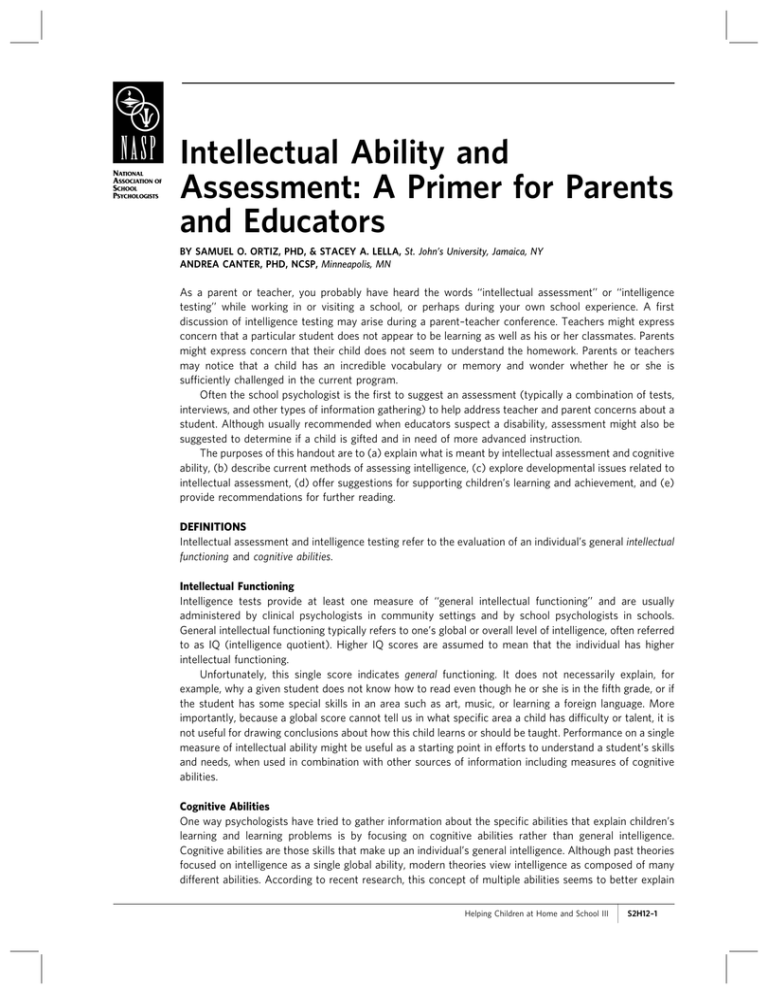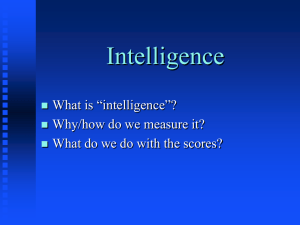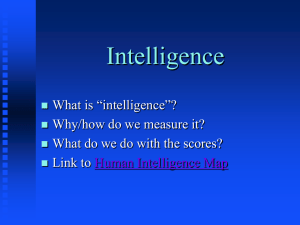Intellectual Ability and Assessment: A Primer for Parents and Educators
advertisement

Intellectual Ability and Assessment: A Primer for Parents and Educators BY SAMUEL O. ORTIZ, PHD, & STACEY A. LELLA, St. John’s University, Jamaica, NY ANDREA CANTER, PHD, NCSP, Minneapolis, MN As a parent or teacher, you probably have heard the words ‘‘intellectual assessment’’ or ‘‘intelligence testing’’ while working in or visiting a school, or perhaps during your own school experience. A first discussion of intelligence testing may arise during a parent–teacher conference. Teachers might express concern that a particular student does not appear to be learning as well as his or her classmates. Parents might express concern that their child does not seem to understand the homework. Parents or teachers may notice that a child has an incredible vocabulary or memory and wonder whether he or she is sufficiently challenged in the current program. Often the school psychologist is the first to suggest an assessment (typically a combination of tests, interviews, and other types of information gathering) to help address teacher and parent concerns about a student. Although usually recommended when educators suspect a disability, assessment might also be suggested to determine if a child is gifted and in need of more advanced instruction. The purposes of this handout are to (a) explain what is meant by intellectual assessment and cognitive ability, (b) describe current methods of assessing intelligence, (c) explore developmental issues related to intellectual assessment, (d) offer suggestions for supporting children’s learning and achievement, and (e) provide recommendations for further reading. DEFINITIONS Intellectual assessment and intelligence testing refer to the evaluation of an individual’s general intellectual functioning and cognitive abilities. Intellectual Functioning Intelligence tests provide at least one measure of ‘‘general intellectual functioning’’ and are usually administered by clinical psychologists in community settings and by school psychologists in schools. General intellectual functioning typically refers to one’s global or overall level of intelligence, often referred to as IQ (intelligence quotient). Higher IQ scores are assumed to mean that the individual has higher intellectual functioning. Unfortunately, this single score indicates general functioning. It does not necessarily explain, for example, why a given student does not know how to read even though he or she is in the fifth grade, or if the student has some special skills in an area such as art, music, or learning a foreign language. More importantly, because a global score cannot tell us in what specific area a child has difficulty or talent, it is not useful for drawing conclusions about how this child learns or should be taught. Performance on a single measure of intellectual ability might be useful as a starting point in efforts to understand a student’s skills and needs, when used in combination with other sources of information including measures of cognitive abilities. Cognitive Abilities One way psychologists have tried to gather information about the specific abilities that explain children’s learning and learning problems is by focusing on cognitive abilities rather than general intelligence. Cognitive abilities are those skills that make up an individual’s general intelligence. Although past theories focused on intelligence as a single global ability, modern theories view intelligence as composed of many different abilities. According to recent research, this concept of multiple abilities seems to better explain Helping Children at Home and School III | S2H12–1 why individuals may perform very well on some types of tasks and poorly on others. See the Recommended Resources below for more information about this view of cognitive ability. METHODS OF ASSESSING INTELLIGENCE Intellectual or cognitive abilities are typically assessed using a combination of standardized tests and ecological measures. Standardized and Norm-Referenced Tests The most common measures of intellectual ability are standardized, norm-referenced intelligence tests, many of which yield a score where average performance is set at 100. The term IQ (or Full Scale IQ–FSIQ) is the traditional designation for these scores, which represent global intelligence and are associated most closely with the Wechsler Scales of Intelligence. Other tests use different terms for scores that mean essentially the same thing, such as General Intellectual Ability (GIA) or Mental Processing Index (MPI). Standardized tests. Intelligence tests or batteries are made up of a series of tasks or subtests that are usually administered on an individual basis, although some group-administered tests are available. These tasks, intended to provide samples of a person’s intelligence or cognitive abilities, with each yielding a score, are referred to as standardized because each task is presented to each examinee in the same or standardized way. When standardized tests are used, performance is thought to show a person’s unique cognitive abilities, taking into account any error resulting from factors such as the individual having a bad day or imperfections in the test itself. Norm-referenced tests. To understand how the individual compares to others, the test scores are then compared to the test’s norms. Norms are established when tests are first developed, using large groups of individuals (often reflecting characteristics of the general population in terms of age, gender, race/ethnicity, geographic region, and socioeconomic status) to determine the range of typical performance. For example, if a child gets 3 questions correct on a test of vocabulary and the norms tell us that most children of the same age correctly respond to 8 to 10 questions, we could say that this child’s vocabulary skills are poor in comparison to most children of the same age. Most intelligence tests are both norm-referenced and standardized. Typically, normreferenced intelligence tests are designed so that the mean or average score falls at 100, and about two-thirds of the population taking the test obtains scores between 85 and 115, which is considered the normal range. S2H12–2 | Intellectual Ability and Assessment Common intelligence tests. Commonly used normreferenced tests include the Wechsler Preschool and Primary Scale of Intelligence (WPPSI), Wechsler Intelligence for Children (WISC), Woodcock–Johnson Tests of Cognitive Abilities (WJ), the Stanford–Binet Intelligence Scale (SB), the Differential Abilities Scale (DAS), and the Kaufman Assessment Battery for Children (KABC). There also exist brief measures of intelligence such as the Wechsler Abbreviated Scale of Intelligence (WASI) and the Kaufman Brief Intelligence Test (K–BIT). All of these measures have been updated and renormed over time. Assessments should be conducted using the most recent edition of the test to ensure up-to-date test norms. Ecological Assessment Procedures In addition to formal intelligence tests, intellectual assessment often includes ecological information—that is, information about the student’s environment and history, or the context of the student’s learning and development. These procedures typically include a review of educational records; observations of the child in different environments (such as classroom, playground, gym); interviews with parents, teachers, and other professionals involved with the student; developmental history; classroom work samples (reading assignments, class tests, workbooks); and measures of adaptive behavior (the student’s degree of independence in various situations). Intelligence test scores can easily be misinterpreted if ecological information is overlooked. For example, an extremely low overall IQ score on an intelligence test could lead one to conclude that a student might have mental retardation (very limited intellectual ability). However, there are many factors that could prevent an individual from demonstrating optimal performance on a given test. These factors include illness, fatigue, poor motivation, missed instruction due to frequent absences from school, frequent moves or school changes, poor vision or hearing, inattention, or difficulties with the English language (a common issue for immigrant students). Without evaluating the possible presence of these kinds of influences, it is impossible to accurately interpret intelligence test scores. DEVELOPMENTAL ISSUES Maturation and school experience will impact the stability of test scores and the utility of tests to predict important outcomes. Further, due to the nature of child development, tests for younger children will often address different skills than tests for adolescents and adults. Stability of Intelligence Test Results The belief that one’s intelligence is stable across the life span has been strongly held for many years. However, parents and even professionals often question why and how intelligence test results seem to vary from one time to another. There are several reasons why test results change. What is measured by one intelligence test is not always the same as what is measured by another. For example, some tests minimize the amount of language needed to understand or complete the tasks. In contrast, other tests may require a great deal of verbal comprehension or responding. Therefore, the scores from these two types of tests may be very different, particularly if the person taking them had difficulties only with tasks that involve language. Actual changes in ability can occur over time. Intelligence tests often tap information that is closely associated with what is taught and learned in school as well as information acquired incidentally through general life experience. For example, questions about names for common objects or general knowledge are often included on intelligence tests. If a child has had frequent absences from school, frequent moves to new schools, or minimal support for learning at home, he or she likely will perform poorly on an intelligence test that emphasizes general knowledge. However, changes in the child’s experiences may lead to higher test scores at a later time. Prediction Intelligence tests often are assumed to measure potential or predict future performance or even adult outcomes. The fact that such tests often include information that is typically learned through experience and school contradicts the belief that IQ is an immutable, static measure of one’s potential. Similarly, a child’s prior experience might preclude accurate prediction of success in certain academic areas. The best predictions of achievement in subjects such as mathematics or reading are made by using cognitive abilities assessments rather than by relying on global scores on general intelligence tests. Cognitive abilities assessments allow measurement of specific skills known to relate to certain subjects. Taken together, these skills are regarded as the student’s academic aptitude. By comparing results on cognitive ability measures with results of achievement tests, we can determine whether a student is performing as expected. Developmental Factors Research tells us that certain abilities develop at different rates. In young children, language development closely follows overall cognitive development as toddlers learn to name objects, to use simple language to communicate their needs, and to use language to acquire information. As children reach school age, more sophisticated language skills enable them to acquire new skills such as reading. As children enter adolescence, they begin to develop and refine their fluid reasoning or abstract thinking abilities, which they apply to learning more complex concepts. The abilities known as crystallized intelligence, which includes vocabulary and other skills heavily influenced by daily linguistic and cultural experiences, continue to grow well into adulthood. Further, some abilities develop precisely and directly as a result of external factors, such as formal schooling, while some skills, such as speed of problem solving or use of visual or spatial information, tend to develop largely independent of schooling or other general life experiences. Due to these developmental factors, tasks on tests of intellectual and cognitive ability will vary for younger versus older students. SUPPORTING CHILDREN’S COGNITIVE ABILITIES Cognitive abilities are not static but can be influenced and modified to some degree by environmental factors, especially if they occur early in life and before formal schooling begins. Activities at home and at school can also have a positive effect on children’s cognitive skills and school achievement. This does not mean that any child can become gifted through home and school interventions, but parents and teachers can certainly help children reach their academic potential. Strategies for Parents Parents can provide support in a variety of ways that allow maximum growth of both academic and nonacademic skills. Support reading and homework activities to enhance academic growth. School tasks need to be practiced to enhance cognitive growth. An environment that has many books, magazines, and newspapers, along with access to computers and the Internet, provides practice to help children improve in reading skills, knowledge, and cognitive abilities. Be a role model. Parents should model for their children the excitement of learning and reading by conversing often and by reading with or to children on a regular basis. Work closely with teachers. Parents can also help their children’s learning and cognitive growth by working closely with teachers to reinforce skills taught in the classroom. Set appropriate expectations. Knowing what is being taught at school helps parents have realistic expectations of their children’s capabilities and performance. Helping Children at Home and School III | S2H12–3 Strategies for Teachers Teachers should understand that the type and quality of instruction can greatly influence students’ learning and the development of their cognitive abilities. Teach cognitive and learning strategies directly. Teachers can use strategies to improve efficiency in learning and the performance of their students. For example, they can provide direct instruction in problemsolving skills, or teach memorization techniques through rehearsal (repeating something over and over), chunking (forming groups of things that are related in some way), or association (connecting one thing with another visually or by actual meaning). Encourage creativity. Teachers should consider whether an assignment can be modified so as to allow students the opportunity to be more creative in its completion. Music, art, drama, and technology can spark the interest of students who might otherwise be uninspired if constrained to rote forms of responding. Teach thematically. Teachers should provide connections between the concepts and content taught in one subject area to those in another subject area. When children see how learning across areas is interrelated, they can generalize their learning by looking for applications that go beyond the specific material or situation at hand. RECOMMENDED RESOURCES Braaten, E., & Felopulos, G. (2003). Straight talk about psychological testing for kids. New York: Guilford Press. Flanagan, D. P., & Harrison, P. (2005). Contemporary intellectual assessment: Theories, tests and issues (2nd ed.). New York: Guilford Press. Guskey, T. R. (2003). How’s my kid doing? A parent’s guide to grades, marks, and report cards. San Francisco: Jossey-Bass. S2H12–4 | Intellectual Ability and Assessment Online Center for the Assessment and Evaluation of Student Learning. (2004, January). What parents should know about test accuracy and use: http://www.caesl. org/briefs/brief4.pdf Addresses frequently asked questions about standardized tests. Harcourt Assessment, Inc. (n.d.). Some things parents should know about testing: http://www.assessmentpsychology. com/harcourtparents.htm An overview of testing issues from a leading test publisher. Institute for Applied Psychometrics: http://www. iapsych.com Information about theories and measurement of cognitive abilities. National Center for Research on Evaluation, Standards and Student Testing (CRESST): http://www.cse. ucla.edu National resource center with information for parents and teachers about student testing, standardized tests, and more. The original edition of this handout appeared in Helping Children at Home and School II (NASP, 2004) and was written by Samuel O. Ortiz, PhD, former codirector of the School Psychology Program at St. John’s University in Queens, NY, and Stacey A. Lella, a certified school psychologist and graduate student in the PsyD School Psychology Program at St. John’s University. It has been updated by Andrea Canter, PhD, NCSP, a school psychologist and consultant in private practice in Minneapolis, MN, and lead editor of Helping Children at Home and School III. E 2010 National Association of School Psychologists, 4340 East West Highway, Suite 402, Bethesda, MD 20814—(301) 657-0270




